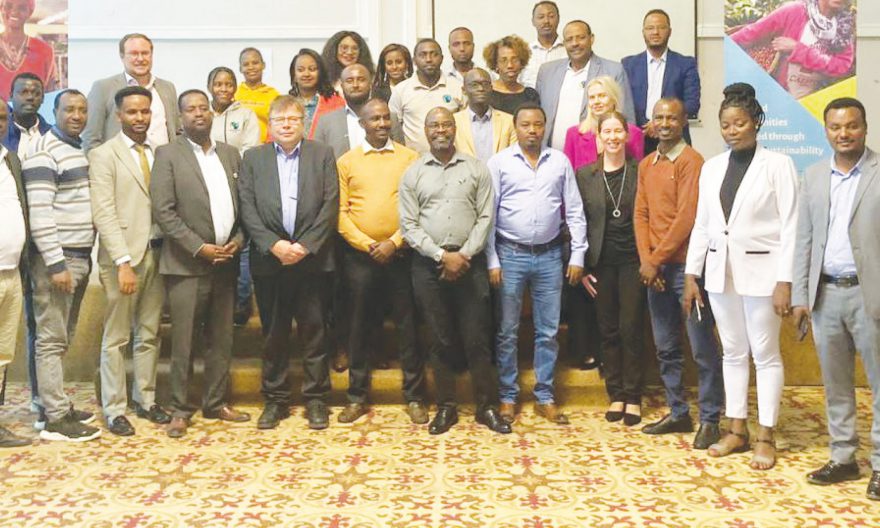
BY KFLEEYESUS ABEBE
It is not uncommon to see business people or corporations making a great deal of profits by processing, selling or reselling products sourced from farmers or their own laborforces. However, most of the time, the care and treatment business people show to their labor force is shocking. In most cases, workforces compelled to work in uncomfortable conditions and treated poorly. Agencies that understood the consequence of such a trend on the lives of employees and on productivity in general are pushing for equity, introduction of minimum wage and provision of conducive environment.
Fairtrade Africa, a largest fair trade system in the world, is among such organizations that advocate and perform activities to improve the lives of the workforces and create favorable working conditions. In addition to its certification and assessment for potential market opportunities, it is performing various activities targeting to uplift the lives of workers and producers through different mechanisms. For instance, supporting employees’ association, providing training and financial assistance to start business and earn additional income were some of the undertakings it accomplished in previous project. The inclusion of women and Persons with Disablities was also part of the initiative.
Sustaining the effort, Fairtrade Africa on Monday launched a million Euros worth project to improve the livelihoods of farmers in the coffee, flower and other horticulture businesses. The project aimed at improving the socioeconomic conditions of workers as well as preserving the ecosystem that everyone depends on.
According to Caspar Pedo, Head of Region: East and Central Africa at Fairtrade Africa, Dignified Opportunities Nurtured through Trade & Sustainability (DONUTS), the program aims at asserting that workers and producers should have to lead a decent life that contribute to the national development. He expressed the goal of the project in flower sector is to ensure the rights of workers.
“The program has components like issues of trade, environment, social and economic development. Two sectors we are looking at is coffee and flower supply chains. In flower sector, we try to ensure much more on workers’ rights but look the bigger picture what we call social dialogue. Social dialogue is basically an issue of workers’ representation: how their working conditions can be improved when we provide them much stronger voice. When workers have voice and be able to meaningfully participate in various matters, to change their lives through collective bargaining, you actually empowering them.”
The project in coffee sector focuses on conserving and rehabilitating the environment, farmers and workers depending on it. “We are looking at sustainability through improved farming system. As you all aware, climate change has impacted coffee producers and coffee supply chain negatively. We are going to pay a lot of attention to new modern farming methods.
Farming methods enable workers to protect their business- how they can effectively improve productivity, sustain the supply chain coinciding with the environment inspite of climate change.”
Ethiopian Coffee and Tea Authority Director General Adugna Debela (PhD) on his part said that improved protection of workers’ rights and benefits contributed significantly for the rise of export volume this year.
“Previously, the sector was in a very complicated situation which led farmers to benefit less. This had discouraged farmers; and reduced productivity, and even compelled some to change their focus to other produces. Taking this into consideration, we have been working with relevant stakeholders to betterment the livelihoods of farmers. Last year, we exported 300 thousand tons of coffee to international market and earned 1.4 billion USD. This has come as the result of activities we carried out with a number of stakeholders including the Fairtrade Africa.”
The Director General also said; work on the environment is timely as it increases productivity and benefits workers sustainably.
“As Arabica Coffee growing country, we understand and consider the serious impact of climate change. So, any project supporting us in mitigating the impact of climate change is welcome and we are ready to work closely. ”
Unions and employees’ organizations, who are keen and ready to work jointly in the project, are always welcomed, he reaffirmed.
Zenabu, who is from Gedeo Coffee Association said: “50,000 farmers are directly dependent on the income they generate from their coffee production. This project, therefore, is of great importance to them as it could have substantial impact on their livelihoods. Concurrently, I think it is timely to work on ecological protection for the very reason it increases product and productivity; and improve the lives of workers sustainably.”
Zenabu also urged everyone to join hands for the successful realization of the project.
The four year long program is funded by the Ministry of Foreign Affairs of Finland and with additional support coming from national fairtrade organizations and commercial partners.
Commenting on previous performance of Fairtrade Africa, Fairtrade Finland Programme Specialist and Representative of the Ministry of Foreign Affairs of Finland Anu Eskonheimo also highlighted a number of success that Fairtrade has registered. According to her, what made this project unique is it attaches due emphasis to environment. “For coffee project, environment projects give more focus; particularly in carbon credit production. And, iIn coffee projects, focusing on the environment and carbon credit production is a huge part of the scheme.
The project, as it is expected to impact the livelihoods of workers and keep the ecosystem safe, stronger inclusion of Persons with Disabilities, women and youth is principal goal of the project. Annu also reaffirmed Finland Government’s commitment to sustain its support for the success of the project.
Likewise, it is vital for agencies and governments to participate in similar initiatives so as to reach more farmers and producers thereby impact their lives positively. The Confederation of Ethiopian Trade Unions, Ethiopian Human Rights Council and other agencies like Fairtrade Africa are urging the government to introduce a minimum wage system. Working along stakes is also imperative to improve the working conditions of employees especially for Persons with Disabilities and women.
THE ETHIOPIAN HERALD THURSDAY 10 NOVEMBER 2022





